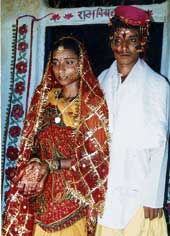 |
Bharti Birla knows what a headache registering marriages is, for she has just gone through the process herself. The Delhi-based advocate, who works for a non-governmental organisation (NGO), was told that to get a marriage registered she would have to furnish the authorities with a wedding card, a photograph of the bride and the groom ? and a gazetted officer. “Okay, let’s say I can organise all this for myself. But what about my maid? Where is she going to get a gazetted officer from,” an exasperated Birla asks. “This rule that a city like Delhi follows makes the system of marriage registration so cumbersome.”
If the Supreme Court of India has its way, Birla’s domestic worker will soon find it easier to get her marriage registered. Not just that ? the court stresses that every marriage in the country will have to be registered. On February 14, the Supreme Court ordered the compulsory registration of marriages. It directed the states and Union Territories (UT) to frame rules or amend the old ones to put the system into effect within three months.
“It’s a progressive judgement,” says Soumya Bhaumik, the human rights education officer of Amnesty International. “Now we have to see how it is taken forward,” says the activist who has done considerable work on marriage registration.
Global conventions have always pressed for compulsory registration of marriages. Article 16 (2) of the international Convention on the Elimination of all kinds of Discrimination against Women (CEDAW) ? to which the Indian government is a signatory ? says: “...all necessary action, including legislation, shall be taken to specify a minimum age for marriage and to make the registration of marriages in an official registry compulsory.”
India always hemmed and hawed on the issue, arguing that its customs and religious practices prevented the country from following suit. While ratifying CEDAW in 1993, India voiced its reservation with the argument that registering marriages was not possible because of the country’s diverse cultures.
The Supreme Court ruling seems to have put a stay on the Indian government’s reservations. The court has asked the states and Union Territories to put out an advertisement, asking for objections to the scheme, within a month. Within two months after that, they would have to come up with their rules.
That marriage registration has its benefits ? especially for women ? goes without saying. The chairperson of the Dehra Dun-based NGO, Rural Litigation and Entitlement Kendra, Avdhash Kaushal, points out that it will curb trafficking of women. “Every woman who is in the trade has been put there by a so-called husband. And we have seen that when there is a police or a legal case, there is no trace of the husband,” he says.
The compulsory registration of marriages will also curb child marriages, for a registry will entail citing details such as the date of birth. And since those wishing to get married would also have to give a declaration specifying whether or not they have been married before, the process will check bigamy and strengthen a woman’s right to inheritance.
But there are some who stress that the problem lies not with the intention of the move, but its implementation. “That’s the real test,” says Birla, who is with the Centre for Social Research in New Delhi.
Bhaumik stresses the need for a central authority to monitor moves taken by the state. “We don’t know what kind of laws the states will come out with. There may be loopholes which will go unchecked if there is no central authority to oversee the various state Acts,” he says.
The problem, the experts point out, is essentially with Hindu marriages, for marriages are registered under most other religious marriage Acts. Under the Indian Christian Marriages Act, 1872, all marriages are entered into a church register after a wedding takes place. Registration is mandatory under the Parsi Marriage and Divorce Act, 1936. Muslim law, too, records a marriage in a nikahnama. And under the Special Marriage Act, 1954 ? valid for all Indian citizens, irrespective of religion ? every marriage is registered. But under the Hindu Marriage Act, 1954, a marriage does not have to be registered.
That explains why the government has not been pushing for compulsory registration. The P.V. Narasimha Rao government in 1994 and the H.D. Deve Gowda government in 1996 rejected a move for compulsory registration. The Atal Behari Vajpayee government too turned down a proposal from the National Human Rights Commission for compulsory registration of Hindu marriages in September, 2000.
But now, with the court having stepped in, activists are happy that a move has been made. A ball set rolling, they stress, can only move on.











